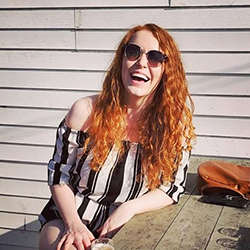Desire and Patriarchy: Samantha Fitzpatrick in Conversation with Liz Harmer

Liz Harmer, whose story "Right to Grapple" appears in The Malahat Review's summer 2019 Issue #207, discusses her upbringing as a committed Christian, patriarchal communities, and the difference between writing fiction and CNF in her Q&A with Malahat Review volunteer Samantha Fitzpatrick. Read an excerpt of "Right to Grapple" here.
Liz Harmer was a Journey Prize finalist and the winner of a National Magazine award, as well as being published in the Best Canadian Stories 2018. She is the author of the novel The Amateurs.
Your debut novel, The Amateurs, digs deep into the anxieties of technology. In “Right to Grapple,” technology, in the form of modern communications technology at least, is almost wholly absent—locked away in Mrs. H__’s house. The main character Marnie, or Breezy as she’s known, remarks that this absence adds to the cult-like atmosphere of the church camp where the story is set. I imagine Breezy’s stay at camp would have drastically changed if she had access to a smartphone. How important was the absence of such technology to the plot development?
One of the first seeds for The Amateurs grew out of the sentence “so much depends on technology.” If you had time machines, would you still experience loss? What would happen to the self who seems to need to define herself in time? I think that many plots can/could hinge on communication devices, travel devices, all sorts of these little bits of our cyborg selves. In many plots, so much depends on miscommunications and misunderstandings—think of the Friar’s note that never reaches Romeo, or so many of the tragedies and comedies. Or Persuasion, or many sitcom plots.
Oddly, I’m writing this from a campus in Virginia where my phone access has been very unreliable, and definitely I have come to take this access for granted. If Breezy/Marnie had had her phone on her, everything would have been different. I was thinking, too, about the way in patriarchal communities or cult-like ones there will be an insistence that certain things are “for your own good,” such as freeing you from your dependence on a phone, and that there is always a sinister side to measures of protection. The phone might be addictive, but it’s also a means by which a person can travel or communicate or find crucial information.
“Right to Grapple” focuses on sound, and the absence of it. And there’s quite a weight to both. What role does sound play here?
When Marnie/Breezy ends up with a fever and then is isolated in the woods, both these things cause her to be keyed up and more aware of every sensation. Part of this is the regular feverish sensitivity, and part of it is the adrenaline of fear. And then there is the sensitivity you have when you have a crush on someone. Also, words have power in this story, the power to seduce or hurt or alienate or conjure. Maybe as they always do.
Belief is central to “Right to Grapple.” We see the tension that differing beliefs can cause, we see variations in belief even within groups, we see resistance to ideas that go against the accepted belief system, and we see the desire to believe what one’s community believes—to fit in. Some of your other work deals with belief as well. What fascinates you about the topic of belief and what drove you to write about it now?
The story was inspired by my own community of belief. I was raised in a Dutch Calvinist subculture, but when I was a young teen I started to go to the youth groups, summer camps, and big conferences of a variety of denominations with very different values than we had. Each had their own ideas about sex, cigarette smoking, which words were wrong to say, baptism, etc. I’m fascinated by belief because I once was a very strong believer. I have been thinking a lot about desire and patriarchy as those things intersected with my own upbringing as a committed Christian among committed Christians, about my own desires and how emotionally and spiritually confusing they were.
When Breezy is quarantined, you bring us near psychological thriller territory. Breezy is lead into the woods and confined to a cabin that reeks of “mildew” and “death.” She is fearful, yet naively trusting. And the frantic internal monologue brought about by her isolation is terrifying. Of course, you’re no stranger to genre writing. Do you play much with genre bending?
Yes, I guess there’s a part of me that feels rebellious about categorization and wants to figure out how certain plot elements inevitably wind up recalling certain genres. I have competing impulses, or complementary ones, maybe: a love for language and metaphor, a fascination with the question of what makes a thing suspenseful (for me it often is not a traditionally suspenseful plot), and an interest in how big ideas might play out in lives. I also have a strong sense of the absurd and the contingent, how our perceived comfort and safety is not eternal, and what happens to the mind in the face of hardship. I feel that trying out genre-writing or using genre conventions is a way to keep ideas fresh for me.
What has been interesting is that you can write a book including portals and the multiverse and find that some people will tell you that it is not science fiction and others will insist that it is. What ends up happening when you play is that you end up with something weird and unexpected, which, for me, is ideal.
I understand you’re working on several writing projects right now—a memoir, a second novel, and a short story collection. What attracts you to these different types of writing?
Yes. I’m in various stages of complete of these three manuscripts. I’m attracted to short stories because I can play in a story and feel less burdened by commitment, and I enjoy the gratification of completing one, too. Sometimes a situation or a character just comes in story form. Novels I enjoy for the opposite reason: I like to have something to sink into for a long period of time, to dawdle and meander, and to be inside a scenario and among certain characters for a while. As for the memoir, there’s a story I’ve been trying to tell for a long time, and I think that a memoir is the place where you can explore the difficulty and confusion of being a human person with a specific mind in a specific set of circumstances. It’s a place to dwell and to philosophize.

Samantha Fitzpatrick
* * * * * * * *









